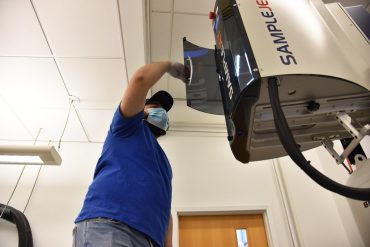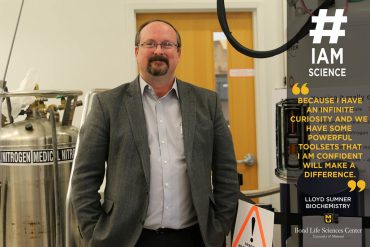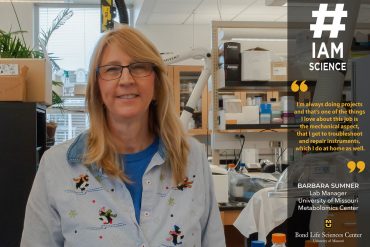Development and Applications of Large-scale Metabolite Profiling Technologies
Lloyd W. Sumner Lab
Research Interests
Dr. Sumner’s research is focused on the development, integration and application of large-scale biochemical profiling of plant metabolites, proteins, and transcripts (metabolomics, proteomics and transcriptomics) for the discovery and characterization of the molecular and biochemical components related to the biosynthesis of plant natural products/specialized metabolites. He also actively applies these integrated omics technologies in a collaborative manner for greater insight into health and disease in a large number of species, including humans. A current focal area is cancer. Dr. Sumner has published over 180 peer-reviewed articles/book chapters and has an h-index of 74. The Sumner lab is highly collaborative and many of these publications are with leading national and international collaborators.
ABOUT THE LAB
The Sumner lab has three current areas of research:
- Addressing grand challenges in metabolomics by integrating complex instrumental ensembles for larger-scale metabolite identifications and greater depth of coverage: Integrated metabolomics is a revolutionary systems biology tool for understanding plant metabolism and elucidating gene function. Although the vast utility of metabolomics is well documented in the literature, its full scientific promise has not yet been realized due to multiple grand challenges. The number one grand challenge of metabolomics is the large-scale, confident chemical identification of metabolites. To address this challenge, the lab has developed sophisticated computational and empirical metabolomics tools for the systematic and biology-directed annotation of plant metabolomes. Examples include UHPLC-MS-SPE-NMR and UHPLC-MS-SPE-MicroED. The lab is also developing UHPLC-timsTofMS/MS for 4D Metabolomics.
- Understand how specialized metabolism is spatially resolved in plant roots and the role that specialized metabolism serves in plant-microbe interactions in the soil/rhizosphere: Border cells are a specialized cell type localized around the root cap of many terrestrial plant species. The exception are those of the Brassicaceae family, which possess border-like cells. Border cells are major secretory tissues, secreting DNA, mucilage, proteins, and metabolites into the rhizosphere. They have been shown to participate heavily in the facilitation of host-microbe interactions. However, they tend to be overlooked in many studies concerning plant roots. As such, their considerable contributions are not properly understood. The Sumner lab aims to understand the metabolite basis of border cell host-microbe interactions.
- Apply integrated metabolomics to discover and elucidate novel biosynthetic pathways in plant system: Triterpene saponins are a class of structurally diverse plant natural products with a wide range of demonstrated bioactivities, including allelopathic, antifungal, antibacterial, antiinsect, anticancer, and antinutritive activities. The antinutritive properties of triterpene saponins in legume forages such as alfalfa and soybean are of particular and substantial economic importance. However, the biosynthesis of triterpene saponins is poorly characterized and this pathway is absent from most textbooks. The lab is using cutting‐edge metabolomics, genome-wide association mapping, correlated gene expression profiling, and traditional molecular validation approaches for gene discovery and characterization related to triterpene saponin biosynthesis in Medicago truncatula.
LAB MEMBERS



Research Topics
-
Data management
-
Host-pathogen interactions
-
Legume-rhizobia interaction
-
Mass spectrometry
-
Metabolic pathway engineering
-
Metabolic pathways and mechanisms
-
Metabolomics
-
Multi-omics and bioinformatics tools
-
Multi-stress plant responses
-
Nitrogen fixation in soybeans
-
NMR
-
Plant immunity and stress responses
-
Plant natural products
-
Plant specialized metabolism
-
Plant-microbe interactions
-
Spatial transcriptomics
-
Data management
-
Host-pathogen interactions
-
Legume-rhizobia interaction
-
Mass spectrometry
-
Metabolic pathway engineering
-
Metabolic pathways and mechanisms
-
Metabolomics
-
Multi-omics and bioinformatics tools
-
Multi-stress plant responses
-
Nitrogen fixation in soybeans
-
NMR
-
Plant immunity and stress responses
-
Plant natural products
-
Plant specialized metabolism
-
Plant-microbe interactions
-
Spatial transcriptomics
In the news

Dec. 13, 2023
MU researchers see future where gut microbiome could help detect colon cancer earlier
Lloyd Sumner (left) and James Amos-Landgraf teamed up to work on colon cancer research shortly after Sumner joined Bond LSC in 2016. | Photo by Sarah Kiefer, Bond LSC By Sarah Kiefer Could there be a better way to detect colon cancer than a colonoscopy? A less invasive test might depend on its association with microbes in the gut. University of Missouri researchers looked at the overall microbiome in a rat model of human colon cancer to discern how differences in the bacteria affect adenomas, benign tumor growth that frequently is precursor to…

Feb. 16, 2021
From Sample to Source
Metabolite screening looks to better understand cancer Research scientist Rajarshi Ghosh in the Lloyd W. Sumner lab loads samples into the Nuclear Magnetic Resonance (MNR) spectrometer for analysis. | Photo by Lauren Hines, Bond LSC. By Lauren Hines | Bond LSC Doctors take blood or urine samples to see what’s going on in the body of a patient, and that’s not all that different from what metabolomics scientists do when looking at metabolites. “[The doctor] may profile 20 or 30 compounds to try to understand what’s going on with your physical health and well-being,” said Lloyd…

March 15, 2017
Lloyd Sumner #IAmScience
Lloyd Sumner, biochemistry professor and Director of the Metabolomics Center at Bond LSC. | photo by Morgan McOlash, Bond LSC By Mary Jane Rogers | Bond LSC “#IAmScience because I have an infinite curiosity and we have some powerful toolsets that I am confident will make a difference, not just in plant biochemistry, but in many scientific arenas.” What change you would like to see in this world because of your research? “I’m a technology junkie at heart. We are developing tools that can potentially advance many areas, and not just my own personal…

Feb. 3, 2023
#IAmScience Barbara Sumner
By Sarah Kiefer | Bond LSC Barbara Sumner grew up in Houston, Texas, and discovered her enthusiasm for chemistry in high school, captivated by how chemical processes can explain how things work in our everyday lives. “It was a subject that I just really loved,” Sumner stated. Sumner originally pursued chemical engineering in college, which she thought she would love because of how much she liked piecing things back together or fixing problems that arise in an experiment. But after deciding she enjoyed learning about the detailed understanding provided by the fundamental chemistry more than…
